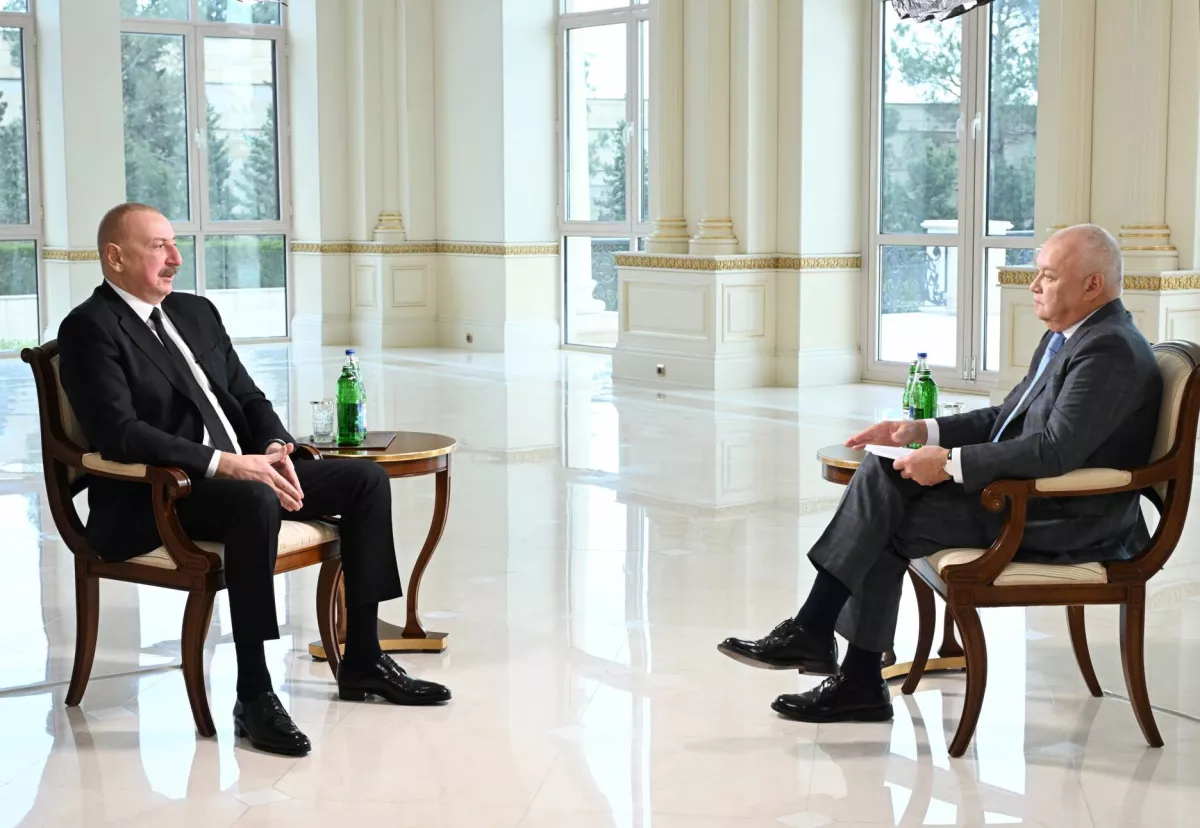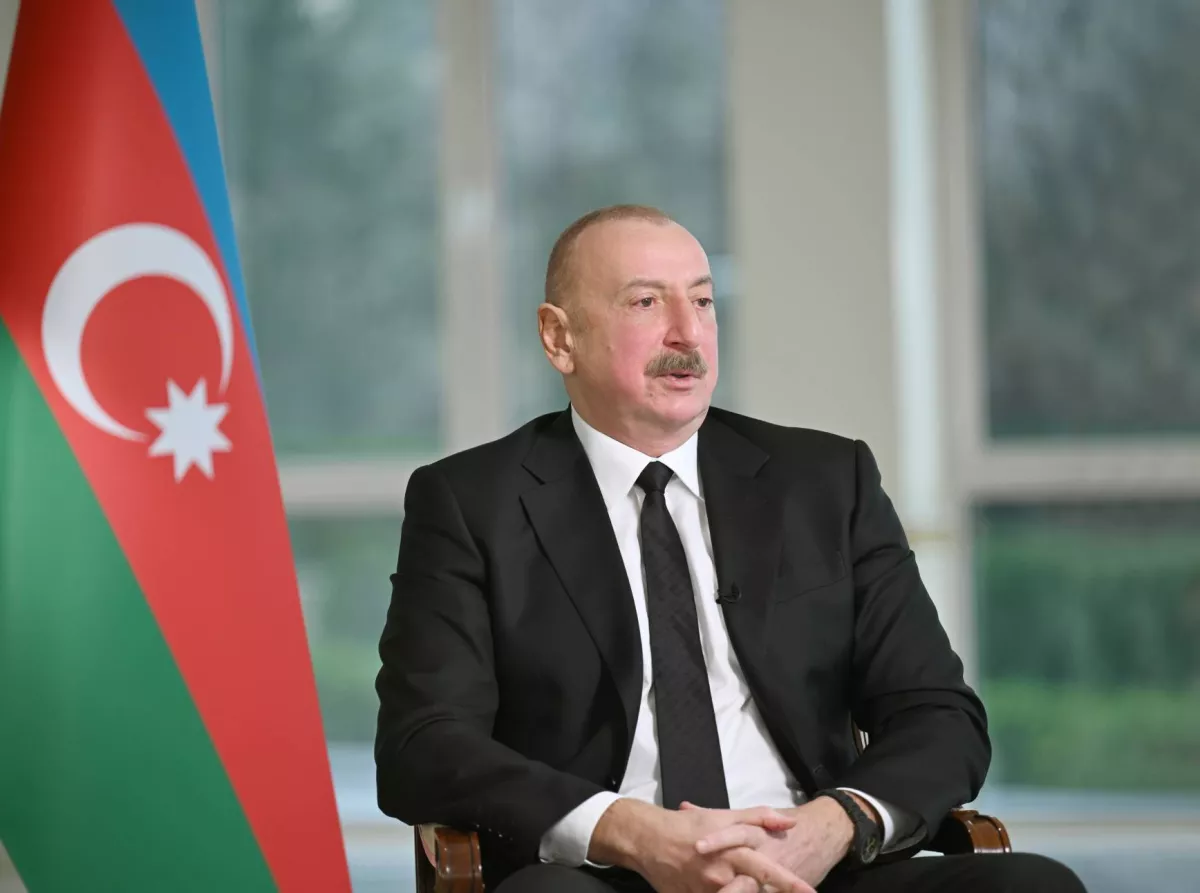Azerbaijan’s vision for regional stability and global relations Caliber.Az analyzes Ilham Aliyev’s latest interview
On December 17, President of Azerbaijan Ilham Aliyev gave an interview to Dmitry Kiselev, Director General of the International News Agency "Russia Today." As usual, the President’s remarks reflected a conceptual perspective on the current regional and global situation, as well as on the prospects for forthcoming changes.
Positively assessing the state of Russian-Azerbaijani relations, Aliyev addressed a pressing question from the Russian journalist about the risk of a potential war between Russia and NATO and Azerbaijan's policy in such a scenario. Aliyev expressed hope that such a scenario could be avoided, considering the catastrophic consequences for all sides and relying on the wisdom of leaders in Washington, Moscow, and other capitals.
He further noted that this hope is bolstered by the election of Donald Trump, whose campaign statements and previous term in office indicate a potential shift in the White House’s geopolitical orientation. Azerbaijan, according to the president, could contribute to easing tensions, given its unique status: in both the West and the East, the country is perceived as an entirely independent player.
Moreover, because Azerbaijan is the only country that is both an ally of Russia and an ally of Türkiye, a NATO member, Aliyev added, In this context, the President also reminded that Baku has previously hosted meetings between the military leadership of Russia and the United States, as well as with NATO representatives. "There are not too many countries that enjoy the trust of the West, Russia, and the East," the president said.
Then Dmitry Kiselev asked a question that clearly concerns the Russian public: is there a need for a Turkish military base in Azerbaijan? Ilham Aliyev responded that such a base is unnecessary, as the Declaration of Alliance between Türkiye and Azerbaijan includes a provision for mutual military assistance in the event of a threat or aggression. This straightforward and comprehensive response reveals the essence of the relationship between Türkiye and Azerbaijan – two brotherly countries committed to assisting each other in the face of external aggression, but their alliance poses no threat to the security of third countries.

One of the main topics of discussion during the interview was the issue of peaceful resolution with Armenia, viewed through the lens of Armenia's pro-Western orientation. Aliyev noted that arms supplies to Armenia from France, India, and the United States, particularly offensive weapons, pose a threat to Azerbaijan's security and indicate revanchist sentiments in Yerevan. In response to Armenia's militaristic stance, Azerbaijan has significantly increased its defence budget for 2025. President Aliyev also pointed out that in the event of armed provocation, Armenia would not receive any help, just as it did not in 2020 or 2023.
Furthermore, Aliyev revealed the essence of two points from the peace agreement project, out of seventeen, on which no agreement has been reached. These are, first, the mutual renunciation of international lawsuits, and second, the non-deployment of representatives from other countries along the border, specifically referring to the EU’s proposed spy mission.
Additionally, the President noted that there are two more issues that the Armenian side must address. The first is to amend its constitution due to territorial claims against Azerbaijan contained within it. The second is to agree to the dissolution of the OSCE Minsk Group, which has lost its relevance following the resolution of the Karabakh conflict.
Thus, it became clear that while the first two points – the renunciation of lawsuits and the non-deployment of third-country representatives along the border – are discussed in the context of the peace agreement, the other two – the amendment of Armenia's Constitution and the dissolution of the OSCE Minsk Group – are not directly included in the draft agreement. However, they are preconditions set by Baku for signing the treaty.
In response to a question about the Armenians of Karabakh, Aliyev briefly explained how Baku, prior to conducting the September 2023 anti-terrorist operation, made the reintegration plan publicly available, but received no response from the Armenian community. The President also emphasized the need to address the issue of around 300,000 Azerbaijanis deported from Armenia. "We are still waiting for a response from the Armenian leadership on how they envision the reintegration of Azerbaijanis into their historical lands. I think that if these two processes follow a parallel course, it will create an even better public atmosphere for peace. Because peace is not solely about a signature under a peace treaty, it is also about a public consensus," Aliyev said.
Touching on the issue of Russian companies' involvement in the reconstruction of Karabakh, the head of state noted that he welcomes investments and contractors from Russia. He recalled that the first investment project was the "KAMAZ" service centre in Jabrayil, opened jointly by him and the leader of Tatarstan, Rustam Minnikhanov. When asked whether Azerbaijan needs a new nuclear power plant, Aliyev responded that Baku still needs to do some "homework," particularly assessing the necessity of such a project.
Another important topic of conversation was the COP29 climate conference. Aliyev, noting the historic agreements achieved at the summit as well as its high level of organization, also spoke about the extensive discrediting campaign launched against Azerbaijan by leading American and French media in the context of the conference. However, the president succinctly expressed the impact of this campaign with one phrase: "This did not cause us any difficulties, it simply caused a feeling of disgust and revulsion."
Discussing Baku's anti-colonial agenda with the journalist, Aliyev emphasized that it is not simply a response to France’s anti-Azerbaijani policy, but has a deeper significance. "Whereas at the very beginning perhaps, it was possible to see it this way [as a response to France - ed.], now, when we are deeply immersed in this topic, when we see the disgusting face of French colonialism, when our representatives actively communicate with residents of French colonies – in their countries, in Baku and in other locations – we actually see what has been hidden from the world public for so many years. And why? Because no one wanted to get involved. No one wanted a headache."

President Aliyev then painted a bleak picture of the foreign policy failures of the Fifth Republic under President Macron, highlighting a series of setbacks across different regions, from Africa to Georgia, while noting that "They have already broken their teeth on us." As a verdict, Aliyev quoted the rating given to France by Moody’s: "Now it's just a little 'A'. Small, small, very small." Thus, the President’s words suggest that under Macron, Azerbaijani-French relations are unlikely to normalize.
Regarding the events in Georgia and the broader issue of Western interference in the affairs of sovereign states, Aliyev emphasized that the situation around Georgia is, in fact, a battle for the Caucasus, further explaining this by referencing the geopolitical choices made by the two other South Caucasus countries. "Azerbaijan is an independent and qualified player able to stand up for itself," the head of state emphasized.
Aliyev revealed some interesting information about Armenia: "It is clear where Armenia is going. It has essentially de facto withdrawn from the CSTO. According to our verified information, the only reason they are not leaving de jure is because they have not yet received the go-ahead from the Department of State."
In response to a question about the Russian language in Azerbaijan, Aliyev provided numerous examples of how it is respected and emphasized an important point: "Such an attitude to the Russian language does not categorically infringe on the Azerbaijani language, our identity or culture. Absolutely not. On the contrary, it creates a friendly atmosphere." He added, "those who try to discriminate against a language for political reasons are making a big mistake."
In conclusion, President Aliyev expressed hopes for a swift end to the war and for the consolidation of Russian society during this difficult period. He also highlighted that the shared commitment of the two countries, their peoples, and leadership lies in a dedication to national roots and traditional values.
Overall, the President's responses conveyed optimism about the future development of the region, while also urging all clear-minded individuals to relentlessly defend their identity and sovereignty.








